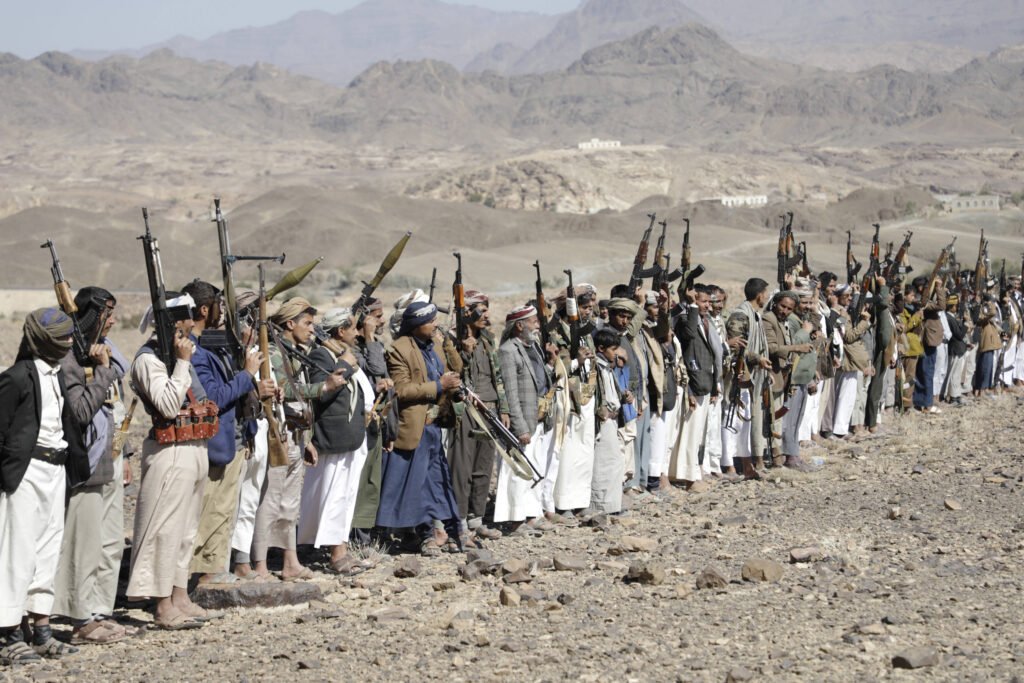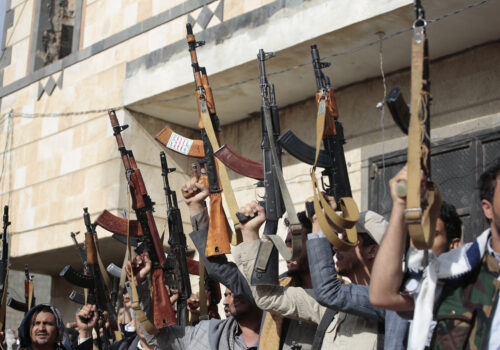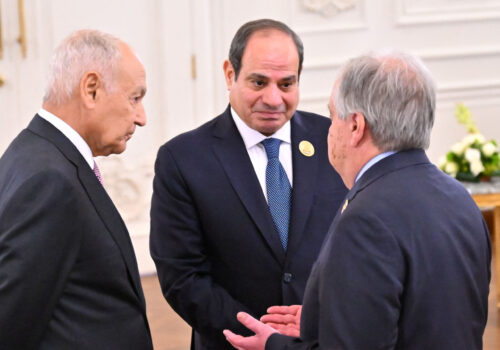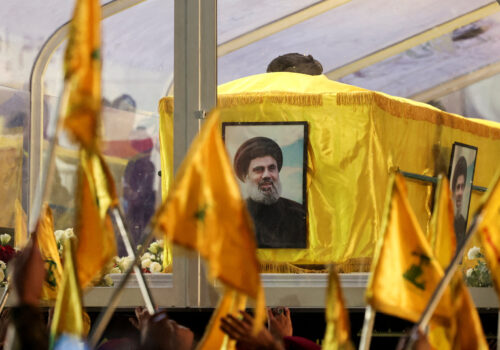Over the past few days, the United States has launched a series of air strikes against Houthi forces in Yemen. This follows the Trump administration’s decision on March 4 to designate the group a foreign terrorist organization (FTO), reversing a decision by the Biden administration to remove the group from this list. Taken together, these actions represent the opening of a new chapter in the United States’ approach to the Houthis. It is also a new chapter in the suffering that the Yemeni people have faced since the country’s civil war erupted following the Houthis’ coup against the government and the seizure of the country’s capital in 2014. But whether this new chapter reduces or exacerbates Yemenis’ suffering in the years ahead will be determined to a significant extent not by what the United States has done so far, but by what it decides to do next.
Given the threat that the Houthis continue to pose to the region, the United States is seeking to weaken the militant group. But to be successful in that goal, Washington needs a strategy that considers Yemen from within, rather than solely through the lens of the Houthis. A comprehensive strategy toward Yemen is the best way—and really the only way in the medium and long term—to avoid causing further pain to the Yemeni people while weakening the Houthis’ grip on power and deterring it from regional aggression.
So, what should this comprehensive strategy include? To begin with, the United States should work with Saudi Arabia and the United Arab Emirates (UAE) to empower the internationally recognized Yemeni government and weaken the Houthis to force the group into pursuing peace with its domestic opponents. A US Yemen policy that has a defined political goal and leverages Saudi and UAE is the best way to both ensure stability in Yemen and protect US interests in the Middle East by hindering the Houthis’ ability to menace the region and maritime trade.
Why the Houthis cannot be ignored
The Houthis’ behavior at the onset of the war in Gaza left the world with no option but to view the Houthis as a global security threat. First, the rebel group attacked maritime trade in the Red Sea, disrupting one of the world’s main trade arteries. Then, it launched missile and drone strikes at Israel. Since the start of this campaign, a concern that the Houthis might next target Saudi Arabia and its oil infrastructure has been constant.
After the blows suffered by Lebanon’s Hezbollah in 2024, the Houthis have become the leading player in Iran’s network of regional allies. They pose a threat to the United States’ regional ally, Israel, and while the direct damage that Houthi attacks have inflicted against Israel so far has been limited, the militant groups has nevertheless threatened Israel’s economy through its attacks. Moreover, there is the persistent possibility that the Houthis will increase their collaboration with other radical nonstate actors, such as al-Qaeda in Yemen and al-Shabaab in Somalia.
Locally, the Houthis have been the main obstacle to achieving peace in Yemen since the civil war ended with a shaky truce in 2022. The group has been unwilling to engage in genuine peace talks with the internationally recognized Yemeni government and its various factions on an equal basis. Prior to the October 7 attacks, Yemen was on the verge of a peace process that, while imperfect, offered a glimmer of hope for the Yemeni people. But instead of committing to peace with other Yemeni factions that could save the country from further fragmentation and economic deterioration, they chose the false heroism of targeting international shipping. Building regional status and winning populist plaudits have now become the Houthis’ major preoccupations.
The Houthis’ regional threat
Roughly three years ago, Saudi Arabia, in its attempt to exit the conflict in Yemen by presenting itself as a neutral broker, was closing in on an agreement with the Houthis that was to encompass basic issues. This included a comprehensive cease-fire, salary payments to public sector employees, and the resumption of talks among the Yemeni parties themselves. But the deal was negotiated exclusively between the Houthis and Saudi Arabia, keeping the other Yemeni players in the dark. This allowed the Saudi side to offer one concession after the other in the absence of the internationally recognized government. As a result, the Houthis became bolder in their demands and less interested in genuine talks with their Yemeni rivals.
It was with the objective of neutralizing security threats from their south that the Saudis reopened backchannel talks with the Houthis in 2022. This resulted not only in a cease of hostilities in 2022 but also in an unforeseen, unprecedented level of closeness between the two sides.
But in one important respect, Saudi Arabia’s policy of rapprochement with the Houthis was short-sighted: it allowed the group to refrain from engaging directly with the Yemeni government, preventing a lasting peace agreement.
Today, Saudi Arabia is at more risk militarily than it likes to admit. The Houthis have expanded coordinated military operations with Iraqi militias that are also tied to Iran, including some that operate in the Saudi-Iraqi border area. Such encirclement against Saudi Arabia by Iran and its allied militias are what provoked Riyadh into launching its war against the Houthis in the first place. For now, though, Riyadh seems unconcerned, perhaps out of an optimistic sense that its recent rapprochement with Iran has neutralized the threat the Houthis and its allied groups pose.
But the Houthis understand Saudi concern about any attacks on its $1.3 trillion worth of giga-projects at the heart of its Vision 2030 economic development plan, which includes major sporting events in the coming years, such as the Asian Winter Games and the World Cup. By the later years of the civil war, the Houthis were able to strike Aramco energy facilities and to do so during international sporting events such as a Formula 1 race in Jeddah. Riyadh does not want to risk any more such attacks in the future, so it has likely concluded that peace with the Houthis on the militant group’s terms is a small price to pay.
Now that the Houthis have become a key player in Iran’s “Axis of Resistance” and they have tested their powers to impact regional politics, however, they are unlikely to remain quiet. There is a growing sense that the Houthis need a war to distract from a deteriorating economic situation in Yemen, which the FTO will certainly worsen. In recent years, the Yemenis who live under Houthi control—a majority of the population—have suffered the worst economic and humanitarian conditions in living memory. This has been coupled with an apparent rise in arbitrary detentions, disappearances, and sometimes the outright murder of civilians under the Houthis.
Saudi Arabia and the UAE, the two regional backers of the recognized Yemeni government and its various elements, have gravitated toward a policy of neutralizing the Houthi threat through political and economic deals with Iran, China, and Russia that in different ways integrate Yemen and recalibrate Saudi ties with the Houthis. Riyadh and Abu Dhabi have taken this course in part because of a lack of trust in the United States for, in their view, having let them down in the past. A key turning point was the US decision to help end the battle in Hodeidah in 2018 through the Stockholm Agreement. Both countries also viewed the lack of a US reaction to Iranian and Houthi attacks on their respective soils in recent years as a sign of Washington’s unwillingness to support its Gulf partners. The United States took no retaliatory action in the wake of the Iranian attacks on Saudi Arabia’s Abqaiq oil plant in September 2019, during the first Trump administration, or to the Houthi attacks on Aramco installations in Jeddah and on Abu Dhabi airport in early 2022, during the Biden administration.
An approach that addresses Yemen as a whole
The United States and its regional partners and allies need to recognize the threat that the Houthis continue to pose to the region. The responses to the group’s aggression so far have been highly reactive—imposing sanctions, restricting humanitarian aid, and conducting military strikes. But these measures hurt the civilian population while Houthi leaders hide in Yemen’s mountainous recesses. Removing them militarily seems like a tall order; indeed, continuing with the current policies may only further entrench their rule. A better approach is to seek to weaken the Houthis to force them into serious talks with the recognized Yemeni government.
Recent US actions are likely to be counterproductive to this goal. For example, cutting off aid to Yemen that flowed through the US Agency for International Development (USAID) amounts to giving up on Yemen, among other parts of the world. For Yemen, the blow is particularly harsh given the lack of a supporting hand to help it out of its economic and political crises. This will destabilize parts of the country, giving more space for radical groups such as al-Qaeda and other nonstate actors to prevail, not to mention exacerbating the suffering of the people. It will also increase the leverage of regional actors such as Iran and international actors such as Russia, to the detriment of the interests of US allies in the region. That will not make the United States safer or stronger, the rubric for foreign policy decisions recently set out by US Secretary of State Marco Rubio.
So, what should the United States do? The Trump administration should press Saudi Arabia and the UAE to work together to strengthen the fragmented Yemeni government. Each country has its roster of clients within the government, but their bickering and infighting needs to stop if there is to be real hope of forcing the Houthis into peace talks. The Houthis believe that the Presidential Leadership Council, the internationally recognized government’s executive body, will sign off on whatever they are presented with by the Saudis. Thus far, they have no reason to think otherwise. The Saudis have kept the government deliberately weak to ensure there is no resistance to the final Saudi-Houthi normalization deal, which is currently in the works.
Without sufficient diplomatic support, economic aid, and coordinated military assistance that reinforces the official Yemeni government’s capacity to rule and negotiate on equal terms, the Houthis are going to continue to be the number one political player in Yemen, a de facto authority en route to de jure. The Houthis will not be deterred from their aggression in the region as long as their domestic opponents are weak and fragmented. The Houthis’ increasing grip on parts of Yemen and their ability to threaten its neighbors is not in the interests of the United States, the Gulf countries, or the Yemeni people.
For all these reasons, the Trump administration needs to have a comprehensive Yemen policy; not just a policy against Houthis. In partnership with the Yemeni government, its Gulf partners, and other regional actors, the United States must fashion a strategy that weakens the Houthis, curbs Iran’s reach, and contributes to a more stable and prosperous Yemen. Such a policy would not only protect US interests but also render the world more secure and prosperous—for example, by preventing a repeat of the Houthis’ attacks on Red Sea shipping. It may seem counterintuitive to the Trump administration’s stated goals of reducing entanglements in distant conflicts, but a comprehensive Yemeni and regional approach to combating the Houthis is in fact the best way to put “America first.”
Osamah Al Rawhani is a nonresident senior fellow with the Scowcroft Middle East Security Initiative at the Atlantic Council’s Middle East Programs and the executive director for policy and partnerships at the Sana’a Center for Strategic Studies.
Further reading
Sat, Mar 15, 2025
Experts react: Trump just ordered major strikes against the Houthis. What does this mean for Yemen, Iran, and beyond?
New Atlanticist By
Atlantic Council experts break down the biggest military campaign of the second Trump administration.
Wed, Mar 5, 2025
The Egyptian plan for postwar Gaza is a good starting point—but it needs changes
New Atlanticist By Thomas S. Warrick
While many obstacles remain, the Egyptian proposal could form the starting point for negotiations over a workable plan for postwar Gaza.
Wed, Mar 5, 2025
Nasrallah’s funeral was Hezbollah’s desperately needed lifeline
MENASource By David Daoud
By bringing the community out to Nasrallah’s funeral in the hundreds of thousands, Hezbollah sent a message to its domestic opponents and the government.
Image: Yemen s Houthis mobilize more fighters amid tensions with USA and Israel - Armed tribesmen raise their weapons in an anti-USA and anti-Israel rally, mobilizing additional Houthi fighters on the outskirts of Sana a, Yemen, 24 December 2024. IMAGO/ Sanaa Yemen Copyright: xHamzaxAlix




